Riley Adams's Blog, page 193
September 14, 2011
Resources to Protect Writers
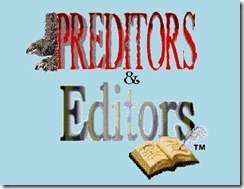 Every once in a while I want to point out a couple of important resources for querying writers. These sites frequently don't get the mentions that other sites do.
Every once in a while I want to point out a couple of important resources for querying writers. These sites frequently don't get the mentions that other sites do.
These two resources help writers protect themselves from scammers. It's an unfortunate fact that there are people out there posing as agents or legitimate publishers who are targeting unsuspecting, hopeful writers.
Many writers are fairly easy marks. Many of us have wanted to be writers for most of our lives. We're eager to share our work with others. We want to be published.
These scammers pose as a legitimate business, which means writers may query them. Posing as real agents or publishers they may say something complimentary about a writer's query (or maybe it won't even be the result of a query—it might be a random email sent to the writer that compliments their blog, etc.). They'll butter them up a little. Then they'll take their money.
You shouldn't have to pay an agent anything upfront. They're paid when you're paid. My agent makes a 15% commission from what I bring in and she earns every bit of it. There should be no reading fees or critiquing fees.
Publishers should pay you. If you're paying them, then you should realize that's not a traditional arrangement. (If you're fine with it, that's okay. Just be very careful and realize there are other options.) If you're wanting to self-publish, consider less-expensive methods like e-publishing directly to e-readers or print on demand services. Be the publisher, yourself. I did it recently, myself—my ebook lists the publisher as Elizabeth Spann Craig.
There are two excellent free resources for writers. One is Preditors and Editors.
Another is Writer Beware, which warns writers about various scams. It's run by A.C. Crispin and Victoria Strauss who do a fantastic job as watchdogs. I've even emailed Victoria Strauss before and she very graciously checked into something for me.
You could also search forums like Absolute Write where writers frequently discuss their experiences with different publishers and agencies. Obviously you'll sometimes come across a writer with a grudge there…just weigh what people say carefully.
If there's a red flag that comes up somewhere in your research…well, naturally there are two sides to every story. But if the agent or publisher you're in contact with has red flags flying everywhere…it's better to just keep on searching.
It's exciting to get an offer from an agent or editor…but it's important to make sure they're reputable and not someone preying on writers.
There are plenty of other resources, of all kinds, available for writers. What are some of your favorites (forums, sites, etc.?)
September 13, 2011
What Type of Promo Should You Try? Whatever Makes You Comfortable.
 I've had a couple of questions lately from writers who are just starting to dip their toes into social media promoting.
I've had a couple of questions lately from writers who are just starting to dip their toes into social media promoting.
They asked me which social medium I recommended. I think they were hoping that there was one main application that would cover everything that they needed to do for promo.
But I don't think there is one application or platform that is The One. I think it depends on what each writer feels comfortable with.
If we don't enjoy something, we're not going to be in any hurry to use it.
Here are some popular ways to network and build a platform online.
Blogging. Blogging is a great way to become part of the writing community. It's a good way to find support and information, too. Plus, it's a way to build a daily writing habit/warm-up into your writing routine. There is definitely some work that goes into it, though. You'll need to be prepared to post on a regular basis and visit other blogs to build readership and forge online friendships.
Facebook. Many writers find Facebook very addictive (which can be a downside.) But it's a good way to interact, on a more casual basis, with other writers…and there are plenty of readers on Facebook, too. Consider having 2 accounts—a personal and professional one. That way old high school friends can't post pictures of you on your professional account's wall.
Twitter. Twitter, for me, is all about sharing resources and information and links to interesting posts. Some people do use Twitter to hang out and interact—but to me, this isn't its strong suit, since the conversations are so fragmented there, as opposed to seeing a whole conversation on a 'wall,' like Facebook. Some writers have mentioned to me that they found Twitter difficult to learn.
Google Plus. Google+ is a new application that's a lot like Facebook. One reason I'd recommend that everyone spend at least a little time on Google+ is to claim your name there. Google will make sure that their listing for your name is near the top of any search engine results (an easy way for readers to find you and your books online.)
But please—don't force yourself to do something you don't enjoy. There are so many different applications you could try, instead.
Got one type of promo you favor over others?
September 12, 2011
15 Reasons for Writers to Love Libraries
[image error]September is National Library Card Sign-up Month here in the States.
I remember my first library card…I felt like such a grown-up. And I knew it was opening up a whole world of reading to me.
I've spent much of my life in a library—reading and writing. It's pained me recently to see libraries fall victim to budget cuts. In honor of libraries and what they've given me, I'm re-running my library post on how writers can gain from using their public library.
15 Reasons for Writers to Love LibrariesYou don't have to spend a lot of money to become a better writer. That's a good thing because most writers don't have a ton of money to throw around.
The library has all the resources a writer needs. It's always been one of my favorite places on Earth. Here are the reasons why libraries are writers' best friends:
Research
*Researching your book: Libraries have computers with internet capabilities. They have books and periodicals on a multitude of different subjects. They also have research librarians/information specialists who can help you with research and find reference materials to help you in your search.
*Researching your genre: You can easily check out a dozen recently-published books in your genre. It's a quick way to see what publishers are looking for.
*Need help with grammar and writing style? The library will have reference books to help you. My favorite style book is Elements of Style by Strunk and White. It's been around for ages.
*Books on the writing craft? Different libraries have different books, but there are some that will be in nearly every branch: like On Writing by Stephen King, Bird by Bird by Anne Lamott, and On Writing Well by William Zinsser.
*Some libraries will have subscriptions to helpful periodicals like Writer's Digest.
*For writers, reading is not only fun—it's essential. Sometimes, though, we might struggle to find time to fit it into our day. The library can help with this. With a library card, you can check out books on tape and "read" in the car during a commute. Or download audio files to an mp3 player to read while doing housework.
A Place to Write
*Has your house gotten crazy? Kids/spouse driving you nuts? Is a coffeehouse too expensive? The public library is a great place to write.
Help With the Submission Process
*Looking for an agent? Look at the acknowledgements page in one of the recent releases in your genre. Agents are nearly always thanked.
*Another great way to find agent and editor names is by using Writer's Market and Literary Market Place. Using these books at the library means saving lots of money—these books are expensive.
*Need help quickly summing up your book in a query letter? Look at back cover copy of novels in your genre.
*Don't have email and you need to email some queries? You can set up a Gmail or Hotmail account that can be accessed from a computer at your local library.
Promotion
*Libraries are major book purchasers. Find out which libraries have your book. Go to WorldCat.org, which searches libraries for content worldwide. You just plug in your book's name, hit the search button, and find the results. For a listing of public libraries, go to Public Libraries.com. You'll get physical addresses, phone numbers, and websites (from which you can get the library's email address).Send the acquisitions librarian an email or postcard with your cover photo, ISBN number, title of the book, publisher's name, your name, release date, short summary, and any good review snippets.
*The librarians at my local branch are my friends, too. They've been incredibly supportive—my book is nearly always checked out of the library or on request because of their generous recommendations of my book to patrons. They've also put my book on a display with other regional authors.
*If you're looking for a place to give a writing workshop or talk, your library usually has a meeting room that's perfect for your event. Many of them will allow you to sell your book as well (it's nice to give a donation to their Friends of the Library program if your signing is for-profit.)
*Libraries also provide locations for writing groups and book clubs to gather. For some writers, meeting with other writers and readers is a great way to network and find support and encouragement.
There are many expensive paths a writer can take toward professional development. But it doesn't have to be that way. Writing shouldn't have to cost more than the pen and paper you're writing on.
Do you remember your first library card? How have you enjoyed your library over the years?
6 Ways to Tame Writers' Public Speaking Fears--by Deborah Sharp

Please join me in welcoming my friend Deb Sharp to Mystery Writing is Murder today. I'm a fan of Deb's Mace Bauer mysteries and can't wait to see what Mama is up to next in her latest release, Mama Sees Stars.
When my first mystery came out four years ago, I was terrified. I
wasn't as nervous about how the book would do as I was about how I
would do. My fear was one shared by legions of other authors. Nope,
not stingy, foodstamp-worthy royalties. Public speaking.
Before I share how I managed to tame that fear, I want to thank
Elizabeth for inviting me to Mystery Writing is Murder. I've learned a
lot from this terrific blog, and I'm grateful to be asked to
contribute. I know she's spotlighted public speaking here before. My
take is a bit different, though. And the terror remains pervasive.
Many surveys show it as No. 1 on the list of human fears, followed by
death at No. 2. Jerry Seinfeld did a bit about the ranking: ''This
means to the average person, if you go to a funeral, you're better off
in the casket than doing the eulogy.''
In the weeks and months leading up to the 2008 release of MAMA DOES
TIME, I obsessed about having to talk about the book. Solitary,
introverted, I was well-suited to my former career as a newspaper
reporter. A crusty old editor told me early on to keep my eyes and
ears open and my mouth shut. Sounded like the perfect job description
to me.
''What if I forgot what I was going to say about the book?'' I fretted
to my husband. ''What if I blather on and on and make no sense? What
if I open my mouth and nothing comes out?''
He poured me a glass of water and handed me a Xanax. Just kidding. It
was a glass of wine. ''Don't worry,'' he said. ''You're over-thinking.
Just wing it.''
Wing it? That strategy may come naturally to my husband, a TV reporter
for NBC and a born ham. He's the life of the party to my wallflower;
Mr. Loquacious to my Mrs. Laconic; the razzle to my dearth of dazzle.
But after 22 years together, he still doesn't know that ''wing it''
are not words found in the vocabulary of his control-freak wife?
So, instead of winging it, I signed up for Toastmasters (
http://www.toastmasters.org/ ) I spent the three months leading up to
my release date learning how not to be afraid. The key to public
speaking is confidence, which can actually be learned through
practice. Who knew? The 87-year-old organization may not suit
everyone, but it definitely served my purpose. Many Toastmasters go on
to hold office within the group, polishing leadership skills and
pursuing networking opportunities. Not being much of a joiner or
networker, my intent was simply to practice through Toastmasters'
speaking exercises and competitions. I wanted to learn as much as I
could in a short period of time to vanquish my fear. For me, it
worked.
So much so that I invited a Toastmasters representative to come preach
the gospel to my fellow introverts at Mystery Writers of
America/Florida Chapter. The crowd we drew was among the largest for
any luncheon program this year. Here are five public speaking tips I
learned through Toastmasters, modified a bit for issues specific to
authors doing signings or appearances:
1. Arrive early and mingle, introducing yourself to strangers. Once
you start to speak, seeing those now-familiar faces in the audience
will help. They'll be rooting for you.
2. Memorize an opening line and practice, practice it. It will get you
off to a good start and build your confidence.
3. Ask questions of the audience. It not only engages them, it makes
you feel less ''on display.'' A safe one is ''How many other writers
are here today?'' because lots of hands usually go up. You can then
introduce any other published authors in the crowd, because it's a
nice thing to do ... and it also takes the spotlight off you.
4. Unless you're Meryl Streep or Al Pacino, resist the urge to read
long passages from your book. Even if you feel comfortable and your
delivery is lively -- good eye contact, lots of pauses, audible
projection -- still keep it short. A few passages, maybe three or
four pages. Any more, and you're likely to hear snoring.
5. A few deep breaths before speaking will steady your voice. S-L-O-W
down. Rushing is a common beginner's mistake. Drinking water is great,
but small sips are best. I learned the hard way that a giant swallow
may lead to a burp. Over the microphone.
Bonus Tip: No need to be fancy, but do dress presentably. Just because
we write in our pajamas, doesn't mean we show up in our pajamas.
How about you? Any public speaking nightmares to share? Any successes?
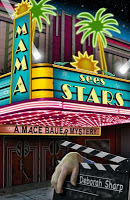
Deborah Sharp writes the funny Mace Bauer Mysteries, set in a sweet-tea-and-barbecue slice of her native Florida. MAMA SEES STARS (September 2011, Midnight Ink) is the series' fourth book, each featuring Mace's wacky mama. Deborah has been interviewed on the Today Show, where she managed to string together some coherent sentences while not throwing up on Al Roker -- major accomplishments for a formerly fearful public speaker. You can read an excerpt from Mama Sees Stars here:
http://mamaseesstars.com/
September 10, 2011
Twitterific
Below are the writing-related links I tweeted last week.
The Writer's Knowledge Base search engine, designed by software engineer and writer Mike Fleming, makes all these links searchable—try it for searches on plotting, characterization, querying, book promo, and more. Sign up for the free monthly WKB newsletter for the web's best links and interviews: http://bit.ly/gx7hg1 .
. 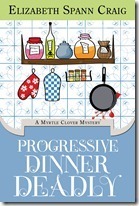
I released an ebook recently. Progressive Dinner Deadly is a Myrtle Clover mystery and is available for $2.99 on Kindle and Nook. Hope you'll mention it to any friends who enjoy mysteries.
There is a book published every 10 seconds. How to stand out in the crowd: http://bit.ly/orHgz4 @Mommy_Authors
Pacing Your Novel Correctly: http://bit.ly/qopUEm
How To Build A List Of Readers For Your Next Book Launch: http://bit.ly/mX0lSy @thecreativepenn
10 Principles of Writing for the Web: http://bit.ly/n14HBS
Writing to read aloud: http://bit.ly/prLljT
Telling Important Stories Through Apps, Not Books: http://bit.ly/okfMJN @janefriedman
Why we need more space adventures: http://on.io9.com/o2m5Ef
Think Outside the Book Cover for Promotional Ideas: http://bit.ly/o2Xb1N
Unexpected gold in self-help books: http://bit.ly/oh0296
Don't lose your story's uniqueness when you're revising: http://bit.ly/nusAxX @BTMargins
On "littering book pages on @Amazon with 1-star reviews." @Penenberg http://ow.ly/6kGtQ via @JaneFriedman RT @Porter_Anderson
Tips for writing bible studies: http://bit.ly/oxERpM
Tips for learning something new--without info overload: http://bit.ly/n2Z8Te
Need help with pacing? http://bit.ly/gbXFZH
Romance--the calm before the storm: http://bit.ly/rdBRQ4
10 Tools for Author Success: #4, Understand Your Market: http://bit.ly/r976wv @SaschaIllyvich
Revealing info about your protagonist through interactions w/ other characters: http://bit.ly/nFtImG @HP4Writers
52 Types of Blog Posts that Are Proven to Work: http://bit.ly/qC59zP
10 Tricks To Motivate Yourself To Write: http://bit.ly/r5Q2bb
Creativity Tweets of the Week: http://bit.ly/oLjrf7 @on_creativity
Tips for making time for your writing: http://bit.ly/nS5adm
5 Questions to Consider When Writing for Children: http://bit.ly/qihNri
Hiring a freelance editor: http://bit.ly/oFxTkb
101 of the Best Fiction Writing Tips, Part 4: http://bit.ly/paKK0m s @writeitsideways
The Procrastinator's Guide to Starting Your Writing Career: http://bit.ly/oRJbJj
Writing lessons 1 writer took from a recent read: http://bit.ly/noBy3K @juliemusil
Self-Publishing–The "American Idol" of the Publishing World: http://bit.ly/pUlmNw
An agent reminds us that our books should be good from the beginning: http://bit.ly/oFTA1W
Joe Konrath tells writers to develop thick skins: http://bit.ly/o0uWVD
Sprinklers and Vacuums: Two Types of Social Media Users: http://bit.ly/pNZFKD
An agent says the querying process is like looking for a job: http://bit.ly/n3ZT52
It's Still Not New (Literary Genre Fiction -- Pah!): http://bit.ly/qJFPzb @shaunduke
5 Ways to Make Our Stories Different & Unique: http://bit.ly/q1bQPe @JodyHedlund
Beware of the Self-Publishing Predators: http://bit.ly/mRoM3s @mybookshepherd
The Ongoing Dilemma of Ebook Pricing: http://bit.ly/njy6JN
By the Time A Self-Published Author Hits it Big, Do They Really Need a Publisher? http://bit.ly/oavXSJ
When to keep your distance: why you don't always want the reader in the thick of the action: http://bit.ly/qMcrgY @dirtywhitecandy
13 Ways Not to Start a Novel: http://bit.ly/pgHDSm @annerallen
5 Time-Saving Tools to Add to Your Twitter Tool Belt: http://bit.ly/pYfkTK
Tips for using multiple POV characters: http://bit.ly/oG90F0 @authorterryo
Successful character traits of writers: http://bit.ly/r6Q60A
Is the Digital Revolution Saving the Novella / Short Story? http://bit.ly/pg4XGk
5 ways to get more Amazon reviews: http://bit.ly/nrBjZK @KMWeiland
8 tips for treating your writing like a business: http://bit.ly/nrBjZK @BookMarketer
10 tips for a successful book signing: http://bit.ly/q476Q8 @JodyHedlund
How some authors paid the bills before they made it big (via @JaneFriedman): http://bit.ly/qMyDOU
How to Reinvent a Book with a New Book Cover: http://bit.ly/rrdqeO
Literary pets: http://bit.ly/pTjCk9
Need tips for handling backstory? http://bit.ly/ol1ycT
A Case Study of Science in Science Fiction: http://bit.ly/qkLsOD
1 writer's reasons for writing have changed: http://bit.ly/pHnbIZ @agent139
25 Things To Know About Self-Publishing (Or, "How To Sell A Bazillionty Books In 17 Minutes"): http://bit.ly/pgreiR @ChuckWendig
The Art And Craft Of Writing And The Dilemma Of Self-Publishing: http://bit.ly/qAeK9Z @thecreativepenn
Building Your Web Presence for Authors: Finding the Best Keywords for Your Website: http://bit.ly/pTFpaD @curiosityquills
The Race to the Bottom: Are low ebook prices hurting writers? http://bit.ly/p2tasU @woodwardkaren
What have you got to lose by starting your 1st draft? http://bit.ly/oCbzRG
The Research Plan: Putting History into Your Historical Fiction: http://bit.ly/qaO3lZ @hartjohnson
Deadly Sin of Writing #6–Drifting in the Doldrums: http://bit.ly/mZ8sAJ
How 1 writer has naturally gravitated toward different genres: http://bit.ly/mOVwPc @JudyAlter
4 Creative Ways to Attract More Visitors to Your Website: http://bit.ly/qF8fpM
Why 1 writer is rethinking her social media habits: http://bit.ly/mOvOzV @inkyelbows
10 Ways to Create Vivid, Compelling Characters: http://bit.ly/pJusv3
New ways to sell short stories: http://bit.ly/oVG8FY
Go back to the basics to promote, advises 1 writer: http://bit.ly/o36LhU @junglereds
Promo--there's hope for shrinking violets: http://bit.ly/qU1itb
What writers can learn from spam: http://bit.ly/ratyya @JamiGold
3 tips for co-authoring a novel: http://bit.ly/o74qRK @LTWFblog
Why Amazon's tablet will challenge Apple in a way that Google can't (Guardian) http://bit.ly/poRLTK
An Agent on Rethinking Pseudonyms: http://bit.ly/rqweiT
A helpful roundup of last week's agent advice, via @HeatherMcCorkle : http://bit.ly/r4fA40
Read YA or don't bother writing it: http://bit.ly/qDQMkF @RoniLoren
How to Capture Ideas Faster Using Evernote: http://bit.ly/nAA2p7 @JeffGoins
Tips for an effective author photo: http://bit.ly/q6Yfnt
Typomania – Higher Consciousness or Curse? http://bit.ly/omyS4Y @PassiveVoiceBlg
An agent reminds us that we don't have to accept an offered contract: http://bit.ly/nLAtQs @greyhausagency
How to Add a Newsletter to Your Blog or Website: http://bit.ly/mTcQhz
For literary inspiration follow @AdviceToWriters. Jon Winokur dispenses writerly wisdom of the ages. http://bit.ly/kaOOvq
Difficulties Superheroes Would Face in the Real World: http://bit.ly/pnOIhZ
Tips for naming your book: http://bit.ly/qsncBa @woodwardkaren
Linear Writing vs. the Scattergun Approach – Which Are You? http://bit.ly/pbAT46 @PBRWriter
1 liberating factor of e-publishing: http://bit.ly/p98eEX @TheresaStevens
Dorte Jakobsen's generous review of my $2.99 ebook. :) http://bit.ly/pmRjDl (on sale here: http://amzn.to/rp41hP )
How to begin querying: http://bit.ly/rt0DZ0 @QueryTracker
Search my tweets-- http://dld.bz/KPgS
How to Choose Between "Into" or "Onto" and Their 2-Word Forms: http://bit.ly/ogex8M
10 lessons for writers: http://bit.ly/qwOCrm @elspethwrites
The Perils of Writing the Indefinable, Genre-Crossing Novel: http://bit.ly/oPSrTJ @BTMargins
How to speak publisher - D is for dummy: http://bit.ly/q36V7w @annerooney
Productivity: Not About Making Every Minute Count: http://bit.ly/ntr13J @camillelaguire
Managing Feedback that Hurts: http://bit.ly/oOecxP
Become a Better Writer by Practicing Gratitude: http://bit.ly/pgBNd2 @writeitsideways
Internal and External Inspirations: http://bit.ly/nrmZFL
Details bring life to a scene, but generalities connect with readers: http://bit.ly/qSeHkz @4kidlit
There's room for all in #publishing, says an editorial director--it shouldn't be us vs. you: http://bit.ly/n5XdPO
Juggling social media & : http://bit.ly/qGYEwb
5 Ways to Make Your Dialogue Flow: http://bit.ly/nW4emb
Tips for eating at conventions: http://bit.ly/oPeoLe
An Argument Against Agent-Publishers: http://bit.ly/nEAHPL @pubperspectives
A Solution for Pantsers with Plotter Envy: http://bit.ly/nSdPpj @RoniLoren
Dialogue - It's Not Just Talking: http://bit.ly/rhg6M1 @greyhausagency
The problem of kids and science fiction: http://bit.ly/qXuGJv @bookviewcafe
Why 1 writer is glad he made a book trailer: http://bit.ly/p3IUPz @BlurbIsAVerb
10 Deadline Tricks to Boost Productivity: http://bit.ly/n9Wm8G @CherylRWrites
Assigning Depth of Field: http://bit.ly/n88BKh @RavenRequiem13
The character-building of Peter V. Brett: http://bit.ly/qDlUGK @FantasyFaction
Links to help you write better dialogue: http://bit.ly/ocD8y0 @EmilyCaseysMuse
Necessary Doesn't Mean Productive (and Vice Versa): http://bit.ly/o3via9 @camillelaguire
Crime fiction murders that bring some characters together: http://bit.ly/pll6Pz @mkinberg
Contradictions in writing advice: http://bit.ly/q4BXzP @LauraPauling
Save My Writing: Focus for the Focus-Challenged: http://bit.ly/nWwetF @fuelyourwriting
Successful character traits of writers: http://bit.ly/nlMHQt
Start Now on Google Plus: http://bit.ly/qfXT90
How To Write Fight Scenes: http://bit.ly/peTHef @TheCreativePenn
When agents edit: http://bit.ly/nbqU9d @rachellegardner
A thoughtful roundup on @JaneFriedman 's blog by industry follower & journalist @Porter_Anderson: http://bit.ly/qeFAFn
On ebook prices: http://bit.ly/oDSXef @DeanWesleySmith
Asking For Amazon Reviews: How Far is Too Far? http://bit.ly/nYpxOn @JodyHedlund
Trends in publishing: http://bit.ly/p2oGzO @40kbooks
15 Frequently Confused Pairs of Nouns: http://bit.ly/q2O3vA
The 3 lives of a writer: http://bit.ly/p2hQIr
30 Ways to Use Your Library Card: http://bit.ly/qvBv3d
Metaphors as tools for worldbuilding and brevity: http://bit.ly/nvaATt @JulietteWade
Use surprises for high-impact storytelling: http://bit.ly/oRIFU4
The Scoop On Then & And Then Sentences: http://bit.ly/o7hOxI
Zen and the Business of Fiction Writing: http://bit.ly/qKg4KI
Perfectionism and Productivity: http://bit.ly/nl8Plo
WKB--now with over 10,000 links to help writers find resources: http://bit.ly/dYRayA
Non-Linear Writing – Focus On Your Story's DNA: Non-Linear Writing – Focus On Your Story's DNA @jhansenwrites
Make Time to Write: http://bit.ly/nR7Yta @Christi_Craig
Coauthoring A Novel: Part 2: http://bit.ly/o5HZxh
For writing-related quotes and inspiration: @Quotes4Writers
Errors and the Dreaded Stigma of Self-Publishing: http://bit.ly/r8vW6X
Making readers care about the products of our imagination is a profound & complex task: http://bit.ly/r14Lnq @CoryDoctorow
How do objects inform storytelling? http://bit.ly/nLJgPP @BTMargins
An agent with advice for agents: http://bit.ly/n4dfys @RachelleGardner
Joe Konrath goes digital and culls 300 paper books: http://bit.ly/qpWyqx
An agent reminds us that authors have the power to influence sales--we just need to get started: http://bit.ly/oQxFVm @jennybent
Writing is all about giving ourselves permission: http://bit.ly/nGIGVz @JamiGold
E-reader and Tablet Ownership Grows Among Women and Over 55s: http://bit.ly/oufGIP
The movie outline---for your novel: http://bit.ly/pptQBy @ajackwriting
Second Book Syndrome: http://bit.ly/pKeaTy
Initial thoughts on ebook challenges: http://bit.ly/n4Cuh0
Building a Following: The 4 Types of Bloggers: http://bit.ly/pJz8x7 @RoniLoren
Best Articles This Week for Writers 9/9/11: http://bit.ly/qSzBHQ @4kidlit
Why 1 publisher won't settle for just a book's physical rights: http://bit.ly/ntv70y
5 things the writing experts won't tell you: http://bit.ly/rlxcj9 @jammer0501
What 1 screenwriter wishes she'd known & what she's now doing differently: http://bit.ly/qYqVLf
5 Tips For Getting Back Into The Writing Groove: http://bit.ly/otHc9c @ProcrastWriter
8 things to consider when choosing character names: http://bit.ly/nteoRL @carrieryan
Why 1 agent doesn't send rejection letters: http://bit.ly/onc0Vx
7 legal tasks authors should complete to prepare for their death: http://bit.ly/oZvVm2 @PassiveVoiceBlg
How an agent learns craft: http://bit.ly/pKBbWF
7 Tips to Increase Your Blog Comments: http://bit.ly/nTd6Kx
The dos and don'ts of the 99 cent price point: http://bit.ly/oWCb6s @ChuckWendig
Alternate History at the Personal Level: http://bit.ly/p2oGzO
The Power of Online Retail: Amazon Could Beat the California Taxman: http://rww.to/nhek3T @ReadWriteWeb
25 Things You Should Know About Queries, Synopses, Treatments: http://bit.ly/pzLLDW @ChuckWendig
Fantasy and science-fiction in anime and manga: http://bit.ly/qTdkRG
7 steps to thinking big: http://bit.ly/p8Jcs7 @michaelhyatt
Critique group anxiety: Why's everybody always picking on me? http://bit.ly/nzE6eZ @flawritersconf
A 12-Step Process for Submitting Copy for a Professional Edit or Critique: http://bit.ly/n7IXu8
Write what you think will sell to the *readers*, not to the publishers: http://bit.ly/oUBBGC @sarahahoyt
Don't be afraid to write a bad book: http://bit.ly/mVKcdI
How to format block quotations: http://bit.ly/n7S5Dr
How to research your book (besides using Google): http://bit.ly/qN68P3
3 schools of thought on ebook pricing: http://bit.ly/q74xbe via @PassiveVoiceBlg
You Still Have A Long Way To Go - Revisions: http://bit.ly/qcN5u8 @greyhausagency
1 writer's plotting process: http://bit.ly/pVCsIq
3 Ways to Determine if Your Writing is Crap: http://bit.ly/p8DeOx @JodyHedlund
How to survive the edit letter: http://bit.ly/n0qTxK @ShariLArnold
September 9, 2011
Writing-Related Tasks vs. Writing
 I hope y'all will bear with me as I explore yet another productivity-related post this week (yes, I really am obsessed.) It's on my mind a lot right now. :)
I hope y'all will bear with me as I explore yet another productivity-related post this week (yes, I really am obsessed.) It's on my mind a lot right now. :)
A couple of times this week I was reminded about the importance of writing-related tasks. Not writing…but either preparing to write (research, sketching out a mini-outline, scheduling time on the calendar to write), doing promo, learning how to do something that results in finding readers (a social media application, self-publishing information, etc.)
Once was during a conversation with another mom about the number of hours our sons were spending practicing their instruments for marching band. This week is a record 15 hours (of actual playing.)
The other mom asked me if I spend that much time writing in a week (she was thinking, in general, of the arts and practicing skills).
I told her that ordinarily I don't write 15 hours in a week (although I've been under deadline crunches where I've written 6 hours a day. But fortunately, those don't happen often.)
That wasn't really completely true, though. I'm not usually putting text on a page for 15 hours a week usually, but I'm spending far more time than that on writing-related tasks—sketching out ideas, making lists of where I'd like to take a story, promoting books that are out, writing blog posts and guest posts, scheduling tweets while building my author platform, learning the ropes of e-publishing, etc.
Those are all important things. Although they're not writing.
I'm definitely streamlining my writing-related tasks, as I mentioned in my post on Wednesday. I've got to keep my online time under control so that I can write as much as possible.
But, even streamlined, these writing-related tasks are still important and necessary.
Writer Camille LaGuire had an interesting post on necessary vs. productive on her blog, The Daring Novelist, this week. She defined necessary as:
…tasks which are necessary but not productive: Creating to do lists, dealing with email, research, studying, learning, practice, eating, sleeping, reading, sharpening pencils, shopping, filling out paperwork.... these are all necessary things. Some of them very necessary, and even immediately relevant to the task at hand. But they are not the task itself.
Camille goes on to say:
What's necessary is necessary. Leave enough room for it. And leave slack in both the necessary and the productive parts of your schedule so that you have elbow room to work.
Although I know that no writing-related tasks are necessary if there's not , at some point, some writing done, it still made me feel better to think that there is value in what I'm doing in the promo, the research into platforms and social media, etc. It supplements the writing. And, although I'm streamlining it all as much as I possibly can, it's okay for me to realize its value and make time for it…and schedule some buffer time between it and other tasks.
It doesn't have to be all or nothing. I don't think we can shut off social media or industry research, etc., cold turkey…not for very long, anyway. Because they're necessary to our writing, too.
What necessary tasks are a part of your writing day? Are you giving yourself enough time to do them? Do you feel guilty when you do them…even though they're necessary?
September 8, 2011
Initial Thoughts on Ebook Challenges
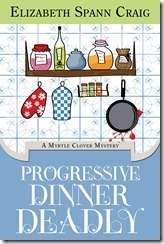 One reason why I think traditionally-published writers are slow to make the leap to being dual-published (traditionally and self-published) is because the learning curve for self-publishing is so very high.
One reason why I think traditionally-published writers are slow to make the leap to being dual-published (traditionally and self-published) is because the learning curve for self-publishing is so very high.
Here are my thoughts, so far, on e-publishing—in the hopes it will help someone else out there. Others, of course, will draw different conclusions from their own experiences…and I'd love to hear them because I'm figuring this out as I go.
Formatting and Conversion
I read and read and read about getting ebooks ready for publication. I even created mobi and epub files of my Word document…and thought they looked pretty good through the Calibre application.
The difference is, though, that I didn't want pretty good. I'm used to having an interior book designer for my books…for the Memphis books, for example, I've got little pigs around the chapter numbers, etc. Just a lot of detail.
I know I posted yesterday on perfectionism and how it holds us back, but I wasn't happy with my efforts at formatting/book design. Plus, there are only so many hours in a day and only so many things a writer can do well (or even competently). So I handed it over to a book designer and was much happier with the results. I paid for that service, but I know I'm putting an investment into my book for (with any luck), long-term results. In fact, I put in about $400-$450 into the ebook (can't remember which), which again, I'm thinking will end up paying off in the long run by having a nice looking book.
Covers
Covers are important for ebooks, but they've always been important in publishing. With ebooks, though, you can even change a cover and see how the results work out. I'm very happy with mine, though (designed by writer and artist Kendel Flaum), so I'm not planning on doing any tinkering. A cover should look good in a thumbnail (such as you'd see on a Kindle or Nook).
Pricing
If you want a 70% royalty on an ebook (or 65% if you're looking at Barnes and Noble's PubIt), you'll price your book at $2.99 and up. If you want to price your book lower than $2.99, you'll get a 35% royalty from Amazon (40% from Barnes & Noble's PubIt).
But you can also run short-term sales on a title. Sales on your ebooks can have other benefits—exposure (see below.) Mine will ordinarily be priced at $2.99, although I've run $.99 sales on it.
Exposure—Promo
For ebooks, promo seems to be a lot about getting noticed. There isn't a physical bookstore, after all. You're trying to get attention in a sea of books.
What helps a lot is to get into the ebook retailer's algorithm ("customers who bought this, also bought this"). So, for me, if I've got a sale running on my book, it might mean (short-term) more sales. This means that people are buying my book at the same time they're downloading other cozy mysteries. So the ebook retailer might recommend my book to cozy mystery readers when they're shopping.
Getting our book noticed by an online retailer like Amazon means trying different things—short-term sales, asking bloggers for reviews (maybe sending them a free copy of the ebook…without requiring a favorable review), tagging books with appropriate tags to help connect readers with our novel, etc. There are also forums where it's appropriate to post about our books---the Meet our Authors forum on Amazon (don't post promo anywhere else there) and the Book Bazaar on Kindle Boards.
Thoughts on earning out with ebooks
With traditional publishing, there's a point where your book earns out the advance you received from the publisher. It's a very happy time. :) With self-publishing, you're also looking to earn out in a way….but to recoup the money you put into the book on the front end (cover, editing, book design, etc.)
The best bet, overall, seems to be to write quickly, edit carefully, and publish as many ebooks as possible online. And, I'll add that I think it's important still to pursue traditional publishing—you'll just learn so much and gain a real confidence in what you can do.
Remember, I do have a directory of ebook professionals that I'm adding to on a nearly daily basis. It's a good starting off place for your search for someone to do a cover, book design, etc. There are a variety of services and a range of prices.
Got any ebook insights? Or ebook questions (although I'm probably not the right person to answer them, since I'm new to this, myself!) ?
September 7, 2011
Perfectionism and Productivity
 I'm continuing on with the productivity theme this week. :) That's because I'm revamping some of my mindset to get more writing done.
I'm continuing on with the productivity theme this week. :) That's because I'm revamping some of my mindset to get more writing done.
I've always been pretty good about resisting perfectionism during first drafts. That's because I'd never get anywhere with a book if I tried to make it perfect as I went. The first draft is supposed to be a disaster. I don't look at what I wrote the day before, just end my writing time with a quick cheat sheet to tell me where I left off and where I need to pick up.
I've even tried to get over my perfectionism for the final draft that I send in to the publisher. I still send last minute emails to editors and my agent saying, "Would you please use this copy of the manuscript and not the one I emailed you yesterday?" I'll do that a couple of times if they don't cut me off. :) But I'm doing better about it. If it's done, it's done---if my editors see a problem with the book, then they'll be sure to let me know and I'll fix it during the revision process.
But now I've run into a new issue—a backlist title that has been giving me fits for a month or more. I'm trying to squeeze in revision work on it right now because I'm waiting on outline approval for the second book in the quilting mystery series…and I have a little break before Hickory Smoked Homicide comes out November 1.
My plan has been to re-release this backlist book as an ebook at some point later this year or early next year. I've hacked it into bits and changed massive parts of it and am still unhappy with it. And I haven't even reached the end of the book yet.
Maybe for you it isn't a backlist book…maybe it's a manuscript that you put aside for a long while and are coming back to. The good thing about doing this is that we can see the manuscript with fresh eyes and can see all its faults. The bad thing is that we can see all its faults. :)
What I've been doing (which I'm now realizing is *not* working for me) is to reread and revise the book from the beginning. So I'll take a few pages, edit them, then rewrite the scene from scratch—taking the meat of the scene and presenting it in a different way.
The problem with doing this is that it takes forever. I don't edit my other manuscripts this way. So why am I treating this one differently?
What I've realized in the last couple of days is that I need to make separate passes through the document—and not to get off-track by spinning my wheels in one particular spot in the story by trying to make it perfect. I'll treat it as a draft. I'll make a pass for basic changes (deeper POV, showing instead of telling.) , a pass for setting, a pass for character development, a pass for subplots that add to the main plot, etc. Then at the end of that, maybe I'll make a pass through and see if I want to add or delete scenes.
This, I think, will at least make me feel like I'm making progress on the book. I need to believe there's a light at the end of the tunnel or I really start losing motivation. With repetitive passes through the book, I'll get a little sick of the book, but it's not as bad as realizing I'm halfway through and have already spent more time on revision as it usually takes to write a first draft.
How do you keep perfectionism from holding you back?
September 6, 2011
Juggling Social Media and Writing
 I read a post from Inkygirl, Debbie Ohi, which really resonated with me the other day.
I read a post from Inkygirl, Debbie Ohi, which really resonated with me the other day.
Debbie is an author and illustrator. She's also very active online and is well-respected in the writing community for helping connect writers with resources.
She's got a lot going on.
I'm a social media addict. I've been a huge fan of online communities before the term "online community" even existed. These days, however, I'm feeling spread too thin over too many social networks: Twitter, Facebook, Google+, Second Life, various writing and illustration communities, plus all the blogs I either manage or in which I participate as a collaborator.
Debbie goes on to say that her main, long-term, goal is to get more books published. And the only way to do that, she explained, is to rethink the amount of time she's spending online.
I've got the same goal—to write as much as possible and have more books published. There's a big shift in my mindset, too. I've realized that I just can't juggle everything every day. I've become more forgiving of myself and a little more flexible. And I realize my limitations.
These are ways I've tried to trim or streamline the amount of time I spend online:
Decrease the times each day that I check email. I also try to have dedicated times that I respond to email.
Plan more than one blog post at a time. I brainstorm blog posts for a week.
Timer: I set a timer to remind myself when I need to take a break from being online.
Blog visiting: I try to visit as many blogs as I can (I love finding out what everyone's up to and love to get writing tips), but I divide up the blogs by different days so I'm not taking too much time out of .
Twitter—I skim my Google Reader and load the most-helpful post links into SocialOomph to post over a 14-16 hour period. First thing in the morning each morning, I make sure Twitter is set to load. Once a day, I check for @ messages and DMs to respond to.
Facebook and Google+: I have my blog set up to post on my Facebook page and just try to check in a couple of times a week (Facebook isn't my favorite.) I enjoy Google+ more, but am trying to pace myself there, too.
Blog breaks: There's also nothing wrong with taking a blogcation to recharge or with decreasing the number of days that you post. Please let us know beforehand before you stop posting that you're taking a hiatus to relax—otherwise, we'll worry about you. :)
How are you managing your online time? Feeling the need to cut back or are you balancing it well?
September 5, 2011
What Hat am I wearing today? by Judy Alter
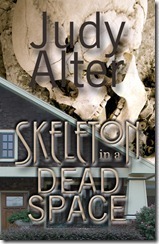 I have many hats—one a cloche with a fan of feathers for when I write mystery (don't you think it makes me look mysterious?), a sunbonnet for western fiction, a fedora for nonfiction, a gimme cap for young-adult works, and, of course, a toque for cookbooks and other food writing. I used to have a mortarboard for my career in academic publishing, but I've turned that in.
I have many hats—one a cloche with a fan of feathers for when I write mystery (don't you think it makes me look mysterious?), a sunbonnet for western fiction, a fedora for nonfiction, a gimme cap for young-adult works, and, of course, a toque for cookbooks and other food writing. I used to have a mortarboard for my career in academic publishing, but I've turned that in.
Some people ask me how I can wear so many hats, but the answer, to me, is simple. It's all writing in one form or another, and I am a writer. I cannot do math and probably couldn't pass high school algebra. But I can work problems out in words—it's what I do best and what gives me satisfaction. I like to take an idea or subject and figure out how to put it into words so that other people will read about it.
When I wrote historical fiction about women and young girls of the American West, I had to imagine myself in the nineteenth century West, though I doubt Libby Custer or Jessie Benton Frémont ever wore a sunbonnet. Still I had to know what they did wear—like weights in the hem of their skirts to keep them from blowing in the wind. And I had to think about what it would be like for Libby to ride across the plains on a reckless horse, or for Lucille Mulhall, the first Wild West cowgirl, to rope several horses, or for Etta Place to take part in a bank robbery and the hard ride of a getaway. It was a wild and exciting ride for a bookish girl like me who never was comfortable on a horse.
Young adult nonfiction was probably the greatest challenge to working out problems in words. I wrote for several companies that published for school libraries. The company would assign me a topic, and I'd research and write, usually about 5,000 words. I have written books on everything from vaccines and surgery to passenger ships, various state histories, biographies of several presidents. Probably the hardest one I ever did was on international women's right.
Wearing a toque was no problem. I actually have one that I've worn to several book signings, but food writing comes easily to me because I love to cook and to eat new food. I did have to learn the mechanics—the proper presentation of a recipe, for instance. And copyright regulations (ingredients of a recipe cannot be copyrighted but directions can).
Mystery has been the hardest hat to keep on my head—that cloche wanted to slip off. I wrote my first mystery, if you want to call it that, almost 50 years ago. It was a knock-off of Nancy Drew that I wrote in the car while my then-husband drove us across country. It was, quite frankly, awful. Around 2000 I wrote a mystery I thought was pretty good and gave it to an agent—naïf that I was I didn't realize that it mattered that cozies were not her field. I may go back and revisit that one someday.
I am forever grateful to Susan Wittig Albert for telling me to join Sisters in Crime. Then I joined the Guppies and Agent Quest and soon learned what an insider's game looking for an agent was and how many people submitted countless queries without success. I was, I discovered, not only a newbie but a small guppie in a very large pond. I read listservs, I read blogs, I took online courses, and I learned so much it's hard to hold it all in my brain. And members of Sisters in Crime and all its sub-groups are incredibly supportive of newbies.
My goal was to publish a mystery, and after seven or so rewrites and six years, Skeleton in a Dead Space launched from Turquoise Morning Press on August 29. I really like that cloche with a feather and intend to wear it for quite a while.
Thanks so much for guest blogging today, Judy! And for giving me some encouragement about trying new genres!
 Judy Alter of Fort Worth, Texas, is the author of about sixty books for children and adults. Her main interest has been the experiences of women in the American West, and she's written six adult novels with that theme and seven young-adult novels, as well as countless children's books, mostly done for libraries on the American West and a variety of other subjects.
Judy Alter of Fort Worth, Texas, is the author of about sixty books for children and adults. Her main interest has been the experiences of women in the American West, and she's written six adult novels with that theme and seven young-adult novels, as well as countless children's books, mostly done for libraries on the American West and a variety of other subjects.
Judy is also the author of a memoir/cookbook, a collection of short stories, young-adult biographies of figures from Texas history, and two books studying the work of Texas author Elmer Kelton. Recently retired after 30 years with Texas Christian University Press, 20 of them as director, she is now devoting her attention to writing mysteries and, still and forever, writing about Texas. You can find Judy at her blog and website.

![Terry3_thumb[1]](https://i.gr-assets.com/images/S/compressed.photo.goodreads.com/hostedimages/1380447585i/1701687.png)



